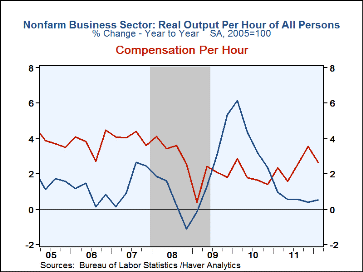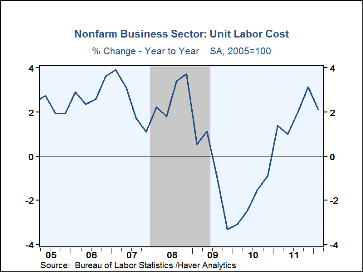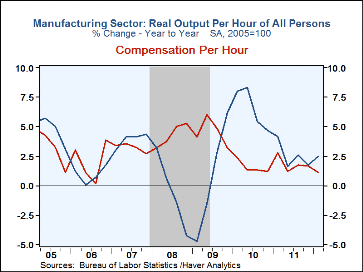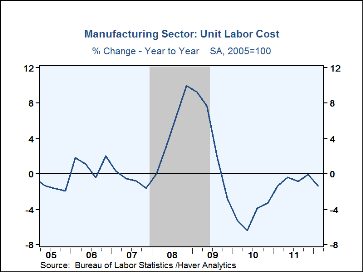 Global| May 03 2012
Global| May 03 2012U.S. Labor Productivity Falls And Drives Up Costs
by:Tom Moeller
|in:Economy in Brief
Summary
Last quarter, labor productivity posted an outright decline of 0.5% (AR) after having weakened considerably during all of last year. The Q1 figure matched expectations. The decline followed last year's notable deterioration in growth [...]
Last quarter, labor productivity posted an outright decline of 0.5% (AR) after having weakened considerably during all of last year. The Q1 figure matched expectations. The decline followed last year's notable deterioration in growth to just 0.6%, its weakest since 2008. Accompanying the slowdown was meaningful growth in compensation. Last quarter's 1.5% rise followed 2.5% growth in 2011 and 1.9% in 2010. Together, weaker productivity and firm compensation caused unit labor costs to advance at an elevated 2.0% annual rate, about the same as it did last year.
Factory sector productivity continued to show the payoff from investment in new technologies. Last quarter's 5.9% growth was a rebound from 0.6% in Q4'11 and pulled y/y growth back to its firm 2011 average. At the same time, growth in compensation last quarter remained a moderate 1.5%. As a result, unit labor costs fell at a 4.2% rate, the swiftest decline in two years.
The productivity & cost figures are available in Haver's USECON database.
| Productivity & Costs (SAAR,%) | Q1'12 | Q4'11 | Q3'11 | Q1 Y/Y | 2011 | 2010 | 2009 |
|---|---|---|---|---|---|---|---|
| Nonfarm Business Sector | |||||||
| Output per Hour (Productivity) | -0.5 | 1.2 | 1.8 | 0.5 | 0.6 | 4.0 | 2.4 |
| Compensation per Hour | 1.5 | 3.9 | 5.7 | 2.6 | 2.5 | 1.9 | 1.7 |
| Unit Labor Costs | 2.0 | 2.7 | 3.9 | 2.1 | 1.9 | -2.0 | -0.7 |
| Manufacturing Sector | |||||||
| Output per Hour | 5.9 | 0.6 | 5.5 | 2.5 | 2.5 | 6.6 | 0.6 |
| Compensation per Hour | 1.5 | 1.9 | 3.2 | 1.1 | 1.8 | 1.5 | 4.5 |
| Unit Labor Costs | -4.2 | 1.3 | -2.2 | -1.3 | -0.7 | -4.7 | 3.9 |
Tom Moeller
AuthorMore in Author Profile »Prior to joining Haver Analytics in 2000, Mr. Moeller worked as the Economist at Chancellor Capital Management from 1985 to 1999. There, he developed comprehensive economic forecasts and interpreted economic data for equity and fixed income portfolio managers. Also at Chancellor, Mr. Moeller worked as an equity analyst and was responsible for researching and rating companies in the economically sensitive automobile and housing industries for investment in Chancellor’s equity portfolio. Prior to joining Chancellor, Mr. Moeller was an Economist at Citibank from 1979 to 1984. He also analyzed pricing behavior in the metals industry for the Council on Wage and Price Stability in Washington, D.C. In 1999, Mr. Moeller received the award for most accurate forecast from the Forecasters' Club of New York. From 1990 to 1992 he was President of the New York Association for Business Economists. Mr. Moeller earned an M.B.A. in Finance from Fordham University, where he graduated in 1987. He holds a Bachelor of Arts in Economics from George Washington University.










